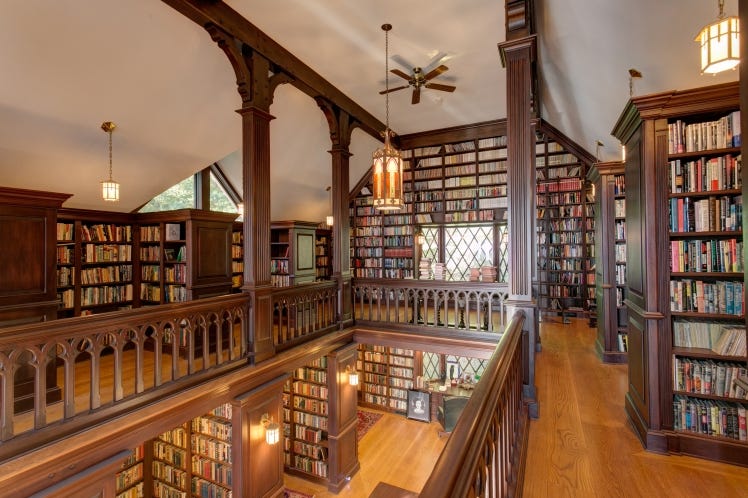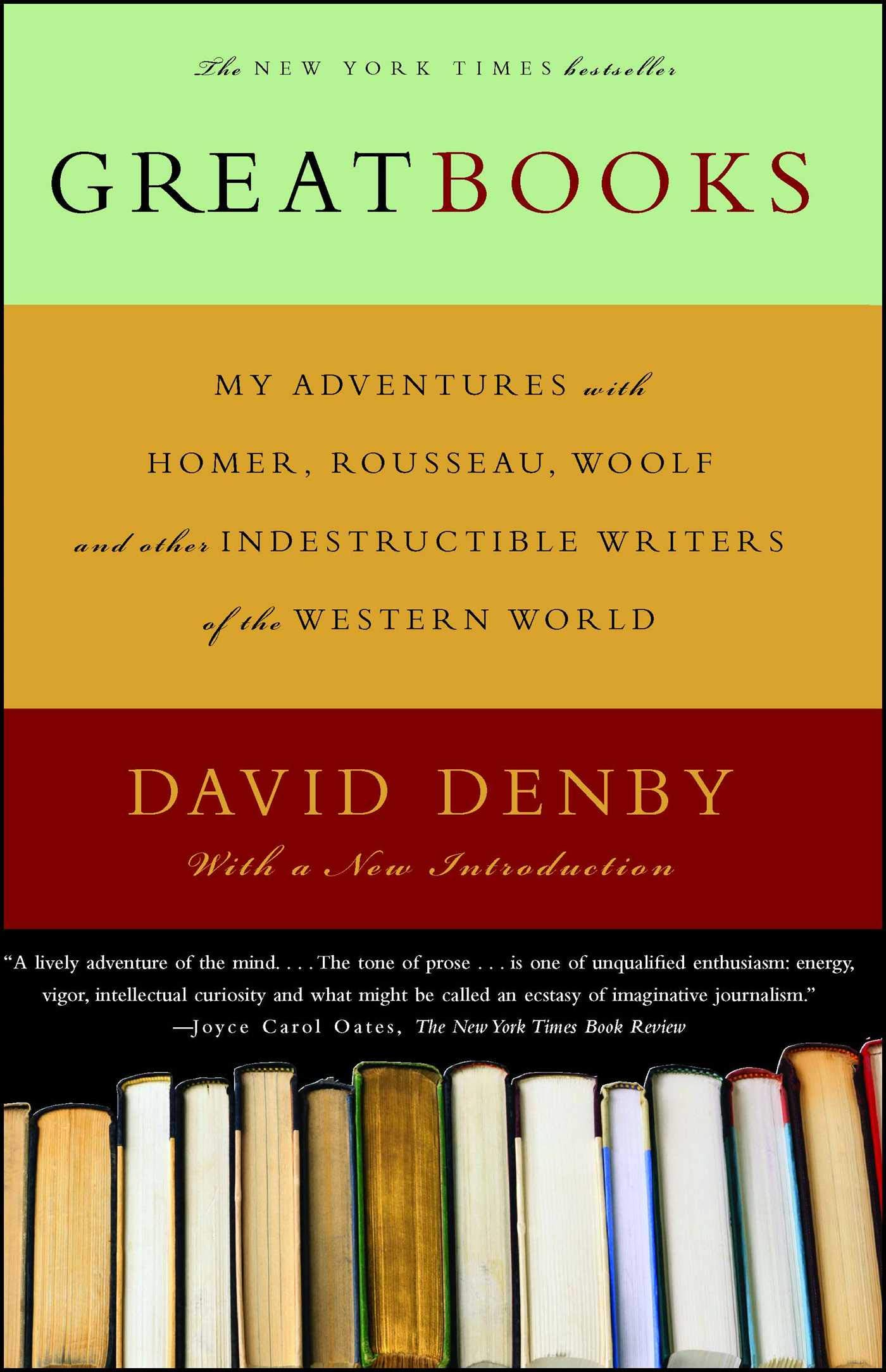I’ve lifted the paywall on this essay from the Archives because I can’t stress enough the power and importance of reading in your development as a person.
If this speaks to you, please consider becoming a regular subscriber here.

“A library of wisdom, is more precious than all wealth, and all things that are desirable cannot be compared to it. Whoever therefore claims to be zealous of truth, of happiness, of wisdom or knowledge, must become a lover of books.”
— Plato
After the War of 1812, when the Library of Congress had been burned, Thomas Jefferson offered to sell his personal library to the U.S. government.
Jefferson’s was the largest personal library in the country, and the 6,487 books that he sold to Congress (for $23,950) more than doubled the size of the library that was lost.
Reading was vital to Jefferson’s education and his state of mind.
“I have never known any distress that an hour’s reading did not relieve.”
― Montesquieu
While I’m not as well-versed in Montesquieu as Jefferson, I do enjoy reading.
You know that. I’ve written about it before:
Collecting Knowledge
What a wondrous time in which we live, when we can carry around libraries the size of Thomas Jefferson’s in our carry-on luggage, thanks to the wonders of devices like the Kindle.
But I still opt for printed books — material I can hold in my hand — every chance I get. I likely have (or will have) more books than I can read (the Japanese call this tsundoku), but that’s nothing to be ashamed of. In fact, you should surround yourself with more books than you’ll ever read.
“The art of not reading is a very important one. It consists in not taking an interest in whatever may be engaging the attention of the general public at any particular time. When some political or ecclesiastical pamphlet, or novel, or poem is making a great commotion, you should remember that he who writes for fools always finds a large public. A precondition for reading good books is not reading bad ones: for life is short.”
— Arthur Schopenhauer, 1890
The result of such an anti-library is that it stimulates the mind and provides plenty of material for research.
Yes, of course the internet is at your fingertips as well (spoiler alert: I use it to track down quotes and excerpts for books I own, but then crack open the physical copy once I narrow it down). But when you tear yourself away from the screen — the hard-driving taskmaster keeping you tethered to video calls, emails, et al. — it can give you a fresh perspective.
As I was roaming the house, trying to track down a book earlier this week, I realized we have bookcases scattered throughout the house. Out of curiosity, I measured how much space my books take up (I didn’t include my wife’s or kids’ books). I calculated about 90 linear feet.
And that still isn’t enough. I have some bookcases on which books are double-shelved, with one row hiding behind another.
And if you think that’s already too much shelf space, allow me to introduce my friend Otto Penzler, who had nearly 60,000 books — mostly mystery first editions — in his home library before he sold his collection.
Take a look at this thing of beauty:
Leaders Begin as Readers
As we covered in the previous edition, reading makes better writing, and writing is the cornerstone of every kind of communication: oral and visual. The best leaders are good communicators.
If you want to be a leader, first you need to be a reader.
“Think before you speak. Read before you think.”
— Fran Lebowitz, 2020
Books As Experiences
It’s funny how we think of books as possessions—things to acquire, maybe even to collect.
They adorn our shelves, our desks, perhaps even our floors, assuming physical space that might be otherwise reserved for mementos, décor, or nothing.
And yet, what are books, but experiences? Passports to times gone by and transportation to places yet unseen.
“Nothing can cure the soul but the senses, just as nothing can cure the senses but the soul.”
— Oscar Wilde, 1890
To me, one of the most wonderful experiences in the world is entering a used bookstore.
It is a physical reminder of the love of learning and a delight to most of my senses: the wondrous sight of so many stories and so much knowledge assembled under one roof; the whispering sound of pages being gently eased from one side to another; the solid feel of the thump in my chest when the two covers slam back together, cushioned by their lesser comrades; and that sweet but stale aroma of light, heat, and water as they react with pulp and slowly subject it to the rigors of time.
A multi-sensory experience is more powerful than one that affects just one sense.
Whether you’re leading a team, launching a product, or creating family memories, you’re far more successful when you touch hearts and minds as well as the eyes, ears, or hands.
Whether it’s the narrator or characters we meet, reading allows us to place ourselves in the minds of others.
And isn’t that what leadership is about?
Knowing what will motivate our team. Understanding what might be needed at a particular time. Showing and inspiring emotions create a closer bond.
Read up on it. It’s true.
“Books were the proper remedy: books of vivid human import, forcing upon their minds the issues, pleasures, busyness, importance and immediacy of that life in which they stand; books of smiling or heroic temper, to excite or to console; books of a large design, shadowing the complexity of that game of consequences to which we all sit down, the hanger-back not least.” ― Robert Louis Stevenson, 1884
Total Recall
With so much information flying at us every day, here’s how to remember what you read. (Farnam Street)
A Two-Hander
Want to read more? If you want to be particularly aggressive about it, you can learn how to read two books a week. (Forge)
Those Book Fines Are Going to Hurt
Over the course of 25 years, precious books, maps, and works of art vanished from a venerable Pittsburg archive. This is the inside story of the $8 million heist from the Carnegie Library. (Smithsonian Magazine)
“Spend each day trying to be a little wiser than you were when you woke up. In my whole life, I have known no wise people (over a broad subject matter area) who didn't read all the time—none, zero.” ― Charlie Munger, 2005
You’ll Remember This Story
As we move to spend more time on digital sources, you might want to read up on why we remember more by reading print than from audio or video. (The Conversation)
The Joy of Reading
Modern life can feel too frantic for books. Use these habit-building strategies to carve out time for the joy of reading. (Psyche)
Kimpton and Chill
Kimpton Hotels and LitHub have formed a book club for travelers. This might be helpful if we ever travel again. (Kimpton Hotels)
“Books are the treasured wealth of the world and the fit inheritance of generations of nations.” — Henry David Thoreau, 1854
🎧 During the 2014 Tournament of Books, in one of the lighter corners of the internet, Christopher Hermelin and Drew Broussard recognized kindred literary spirits in the like-minded commentary they were both posting about books and reading. And then it happened. An idea was born, over cheap beer in a SoHo dive bar. It would be a podcast unlike any other. Many years and hundreds of books later, So Many Damn Books continues to blend the high and the low, the wicked and the divine, the sober and the not-so-sober, the famous and the infamous. Author guests, special drinks, and more book recs than you can shake a stick at -- what more could you need?
📚 At the age of 48, writer and film critic David Denby returned to Columbia University and re-enrolled in two core courses in Western civilization to confront the literary and philosophical masterpieces — the “great books” — that are now at the heart of the culture wars. In Great Books, he leads us on a glorious tour, a rediscovery and celebration of such authors as Homer and Boccaccio, Locke and Nietzsche. Conrad and Woolf. The resulting personal odyssey is an engaging blend of self-discovery, cultural commentary, reporting, criticism, and autobiography -- an inspiration for anyone in love with the written word. \
There’s so much to learn,














